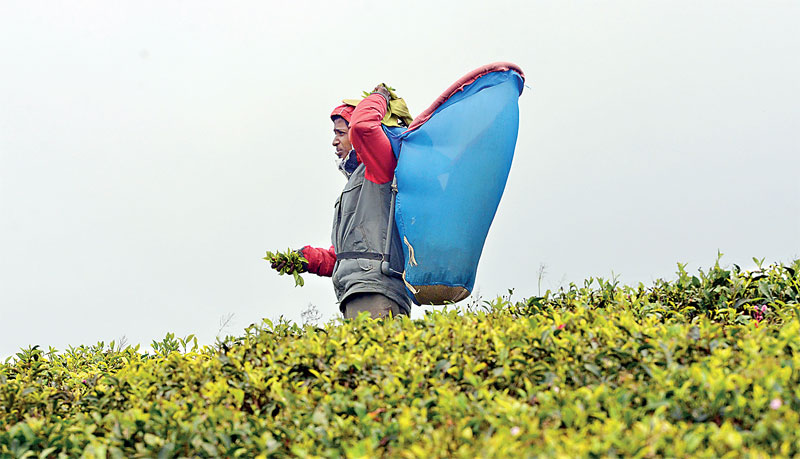Monday Feb 23, 2026
Monday Feb 23, 2026
Thursday, 11 November 2021 00:47 - - {{hitsCtrl.values.hits}}

Without any prior planning or notice, our entire sector has been coerced into blindly participating in the most unscientific experiment ever attempted in Sri Lanka’s history. We are all left to now anticipate what the implications of an immediate, nation-wide halt to all established and essential best practices relating to plant nutrition, pest, fungus and weeds will be – Pic by Shehan Gunasekara
“An incentive is a bullet, a key: an often tiny object with astonishing power to change a situation”
– Economist, Steven Levitt
 Almost seven months from the Government’s initial decision to ban the import and use of synthetic fertilisers and as at the date of this publication, Sri Lanka’s entire agriculture and plantation economy is still frantically in search of any viable option to mitigate the threat of declining yields.
Almost seven months from the Government’s initial decision to ban the import and use of synthetic fertilisers and as at the date of this publication, Sri Lanka’s entire agriculture and plantation economy is still frantically in search of any viable option to mitigate the threat of declining yields.
Without any prior planning or notice, our entire sector has been coerced into blindly participating in the most unscientific experiment ever attempted in Sri Lanka’s history. We are all left to now anticipate what the implications of an immediate, nation-wide halt to all established and essential best practices relating to plant nutrition, pest, fungus and weeds will be.
We are told that arrangements are being made to import organic fertiliser from various, untested sources, and agreements are minted to produce organic fertiliser locally, much akin to attempting to rebuild an airplane while it is still in flight. Nevertheless, the inconvenient truth remains. At present, all supplies of ‘organic’ and inorganic fertiliser are in short supply.
Stocks which are available, have increased in price owing to both supply-demand dynamics, disrupted supply chains and unprecedented increases in landed costs. These escalating payments are making Sri Lankan tea’s already high cost of production (COP) even higher, which is placing Sri Lankan plantations under even further stress. This a few short months after an increase in worker wages was thrust through the Wages Board.
Sri Lankan tea’s strange new normal needs to be re-evaluated immediately
With the end of the year approaching, and the window for fertilising crops closing, it appears that the industry will be locked into at least one – if not more – growth cycles absent basic nutrients of nitrogen, potassium, and phosphorus, and with no ability to control pests and weeds. Without immediate solutions, the broad consensus among those with expertise is that we can start to see exponentially worse crop losses starting from the end of 2021, hitting approximately 40% by next year.
If RPCs were to have disregarded basic agronomic practices and norms in such a manner of their own volition, it would have been called criminal mismanagement. With agricultural best practices now being roundly ignored in favour of a largely undefined and unplanned strategy for transforming Sri Lanka into a nation with “100% organic agriculture”, this historic, and intentionally misinformed self-sabotage is being repackaged as visionary and progressive.
Meanwhile, the nation’s best agricultural experts are being ignored or in the case of Prof. Buddhi Marambe, sidelined and silenced, on the grounds that he simply stated scientific facts regarding the current agro-chemical ban and had been consistent in doing so, because he had previously spoken up against the previous Government’s disastrous decision to suspend glyphosate imports.
This was a policy which resulted in the rejection of Sri Lankan tea exports as a result of issues with Maximum Residue Limits (MRLs), and caused the permanent loss of extremely high value markets in Japan, and a similar escalation in costs; all without a single shred of scientific evidence being provided to justify the lasting damage caused. As a result, the Government of the time was compelled to backpedal on its decision, but not without irreversible damage being done for no apparent reason.
This “justification” highlights a dangerous trend of politicisation of science. If the science does not agree with politics, then it now appears acceptable to simply dismiss the scientists, rather than engage with facts and ground realities.
A simple extrapolation shows a grim future for workers
Regardless of short-term political expediency, reality has a way of asserting itself. Spread across 14 districts, the tea industry alone provides direct employment to over 600,000 people engaged in cultivation and processing and indirect employment to a further 200,000 involved in the supply chain. The sector provides complete livelihood support for a resident population of one million in Regional Plantation Companies (RPCs) and 450,000 tea smallholders with one million dependents, hence supporting a total population of nearly 2.5 million.
When considering both employment and livelihood generation, it is estimated that the industry sustains more than 10% of our national population and its net foreign exchange earnings are only second to the garment industry.
Even if “organic” fertiliser is made available, there are still serious concerns as to whether it can provide sufficient nutrients. Hence, it appears that the writing is on the wall. With insufficient nutrients as a result of the unplanned push for organic, we anticipate a series of cascading failures stemming from a collapse in productivity. No amount of rhetoric will be able to turn back the tide of negative sentiment against such developments.
If not land productivity, at least labour
Unlike the garment industry, where progressive incentive structures were allowed to flourish, in our industry, workers remain bound to an outdated colonial era daily wage model. As a result, unlike the dynamism of the apparel sector, Sri Lanka’s plantation sector is also weighed down with one of the lowest labour productivity rates in the world. The combination of low land and labour productivity will create a series of cascading failures.
The only measure that could at least temporarily mitigate this dynamic is the implementation of productivity linked wages. This is a model which has the support of all RPCs, and which was has been widely practiced with tremendous success by tea smallholders. While they have been implemented with ease in low-mid grown estates, it is only in the high-grown regions, where resistance to these models has been encountered.
Crucially, this resistance is not from workers who have experience with productivity linked wages, but rather with Trade Unions who would likely lose relevance if such models were implemented. The benefits for workers are immense. In addition to creating a potential monthly earnings per worker of between Rs. 37,000-Rs. 62,000, under previous proposals advanced by RPCs.
This will also give workers flexi-hours, empowering them to choose when and how they work. Given the labour shortages prevalent across the entire tea industry, such a move would at long last incentivise workers effectively, and reward them for achieving their full individual potential, thereby significantly optimising labour productivity.
However, without a scientific resolution to the fertiliser crisis, wage reforms can only serve as a stop gap measure. As land productivity drops, RPCs, State plantations and smallholders alike will be forced to reduce the amount of work offered, leading to a continuous diminution of worker earnings.
The few remaining workers in the plantation industry will have no choice but to try their luck in other lines of work, accelerating the ongoing migration of labour from the estate sector. It is unclear whether other economic sectors have the capacity to absorb such a large group of workers at once.
Already, we have seen multiple outbreaks of mob violence on estates, with the majority of such incidents being triggered by disputes over wages. Without proper solutions to these burning issues, worker wages will eventually be disrupted. Will the authorities take responsibility for what will follow?
[Dr. Roshan Rajadurai is the Managing Director of the Plantation Sector of Hayleys PLC (which comprise Kelani Valley Plantations, Talawakelle Tea Estates and Horana Plantations). A former Chairman of the Planters’ Association of Ceylon, Dr. Rajadurai has 36 years of experience in the plantation sector.]